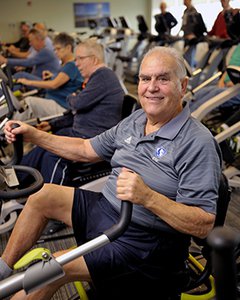SBL Cardiology helps Charleston man commit to his health with METS program.
For much of his life, Renshaw Garshelis – or Renny to those who know him – thought he was invincible.
In 1993, Renny suffered a heart attack in the Emergency Department and underwent a quadruple bypass to clear massive blockages, but he didn’t slow down or adjust his habits once the crisis passed. “The doctor told me I should be dead. I had blockages of 95 to 100 percent in five arteries,” he said.
After a successful open-heart surgery, Renny went through cardiac rehabilitation classes offered through SBL’s Monitored Exercise Testing Services (METS), and then he returned to his busy life. “I went through it like it was nothing. I didn’t think I needed to continue exercising because I was a physical education teacher and I traveled the country officiating high school and college wrestling tournaments,” he said. “I was burning the candle at both ends, and I didn’t have time.”
While his life slowed down in 2003 when Renny retired from teaching at Charleston Middle School and he stopped officiating a few years later, Renny still didn’t make his health a priority. “There was a period of time when I didn’t work out at all. I gained weight. I was eating wrong and doing all the wrong things,” he said. A diagnosis of type 2 diabetes followed and, in 2013, Renny suffered a great personal tragedy with the loss of his adult son. “I kind of went into hibernation,” he conceded.
2018 became a turning point for Renny when, at the age of 72, he was diagnosed with severe aortic valve stenosis, a disease of the heart valve in which blood flow from the heart is decreased. He had visited his doctor due to lingering chest congestion and was immediately referred to Prairie Heart Cardiologist Jason Trager, DO, who practices at Sarah Bush Lincoln. “I hadn’t been to a cardiologist in years,” he said. “Dr. Trager immediately noticed that I had a problem, and he told me that I needed a new heart valve. It was either that or risk sudden death.”
This time, Renny decided that he would approach his health with the seriousness it deserved. Renny had a transcatheter aortic valve replacement (TAVR) in November 2018 and was home within 36 hours. The less-invasive valve replacement procedure doesn’t require open heart surgery. “It’s amazing what they can do,” he said.
He then registered for METS cardiac rehab classes— just as he had done in 1993— but this time he has faithfully attended class three times a week ever since. METS is staffed by registered nurses and certified exercise specialists who provide education to participants and who serve as a support system to help people begin living more healthfully. For Renny, that meant changing his eating habits and becoming dedicated to exercise.
“METS is the best thing that has happened to me, and I’m sticking with it. I’m a real believer in it now,” he said. “The instructors are very kind, very efficient and extremely professional— and a lot of fun too! This is my second family. I enjoy the people. We tease each other, but we get down to business too. It’s a 40-minute workout, three days a week, and it’s wonderful.”
Remembering his days as an Eastern Illinois University Wresting Hall of Famer, Renny does his best to make his workouts count. “Some days I go as hard as I can. I sweat a lot and I enjoy it. I feel so good after I’m done,” he said. “The instructors have also taught me what a heart-healthy diet is. I’m not perfect with it, but I’m extremely educated now.”
Renny also credits his good friend and mentor Tom Woodall for keeping him engaged in the program. Woodall is a former EIU professor and cross country coach who was instrumental in starting the METS program 35 years ago. “I think you’d have to go a long way and visit lots of places to find a program comparable to this one– from the facilities to the staff to everything about it. It’s just amazing,” he said.
Since Renny’s surgery a little more than a year ago, he has lost 55 pounds and reduced his need for insulin by more than half. “I used to take five shots a day and now I take two,” he said. “I feel so much better now. I know I have a long way to go, but if I keep this up, I might live a little bit longer.”
Through it all, Renny calls himself a survivalist. “I never look back and I try to learn from the mistakes I’ve made,” he said. “It’s amazing what I’m able to do now that I’m working on my health.”
For more information about The Heart Center, or to make an appointment, call 217 238-4960. For more information about cardiac rehabilitation classes through METS, call 217 258-2177.

